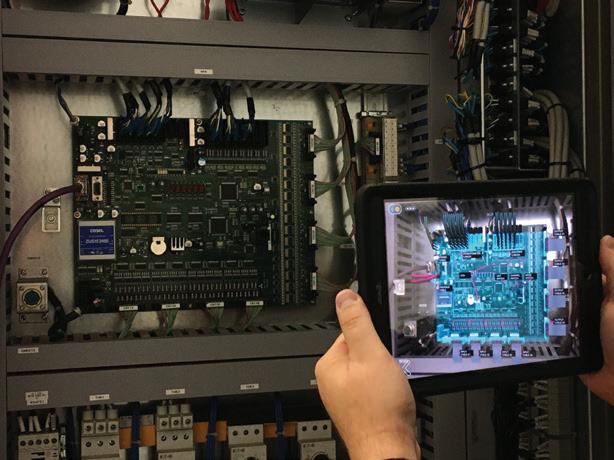
19 minute read
MEMBER PROFILE
Leadership
SMC Packaging Group: ‘Open. Transparent. Honest. Successful’
Advertisement
BY STEVE YOUNG
Photos courtesy of Southern Missouri Container.
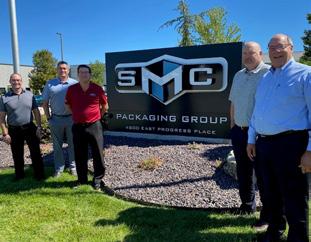
The SMC team, from left: Matthew Massey, operations manager; Matt Wallace, planning manager; Randy Bachus, executive vice president; Bryan Vote, national accounts manager; and Kevin Ausburn, chairman and CEO. (Not pictured: Mark MacNay, senior vice president and general manager; Rich Bachus, president and chief operating officer; and Matt Ausburn, chief financial officer.) COMPANY: SMC Packaging Group
ESTABLISHED: 1972
JOINED AICC: 1975
PHONE: 800-999-7666
WEBSITE:
www.smcpackaging.com
LOCATIONS: Springfield, Missouri; Kansas City, Missouri; Conway, Arkansas; Tulsa, Oklahoma
OWNERS: Kevin Ausburn
In 1972, two entrepreneurs from Hoerner Boxes’ Springfield, Missouri, corrugator plant founded Southern Missouri Containers (SMC). Ross Ausburn and Charles “Chuck” Bachus both started in the industry at Hoerner’s plant in Sand Springs, Oklahoma, and later moved to its Springfield location. As the story goes, Bachus, then sales manager, went into Ausburn’s office to give him the news that he wanted to branch out on his own, at which time Ausburn, the general manager, presented him with a copy of his own business plan to do the same thing. As Kevin Ausburn, Ross’s son and now chairman and CEO of the company, tells it, “They really hadn’t talked to each other about starting a business prior to that time, but that started a conversation that, ‘we need to do this together.’ That was the birthing, or genesis, of Southern Missouri Containers on February 1, 1972.”
Today, SMC Packaging Group, created to tie all the individual companies under one name for branding purposes, is a $155 million company with nine production and warehouse locations across Missouri, Arkansas, and Oklahoma, producing 1.4 billion square feet of board annually. Its 550 employees work in its four principal divisions: Southern Missouri Containers’ main facilities in Springfield; Wonder State Box in Conway, Arkansas.; Arrowhead Containers in Kansas City, Missouri; and Sooner Packaging in Tulsa, Oklahoma. At its Springfield operations, SMC occupies four buildings with 669,000 square feet under roof. The company houses its 98" Fosber corrugator in 135,000 square feet on North Belcrest Avenue, plus another 16,000-square-foot warehouse, also on North Belcrest. On Division Street, a finished-goods warehouse contains 103,000 square feet, and its new, expanded location on East Progress
Place contains 415,000 square feet. The long-term view, says Ausburn, is to consolidate all its Springfield operations into the East Progress Place location.
In Kansas City, Arrowhead Containers, a sheet plant, operates in 85,000 square feet, with another 70,000 in an off-site warehouse. Wonder State Box, also a sheet plant, occupies 130,000 square feet in Conway and 45,000 square feet in Harrison, Arkansas, while Sooner Packaging in Tulsa, a warehouse distribution site, is in 50,000. According to Ausburn, the four locations enable SMC’s geographic reach, which covers Missouri, eastern Kansas, Oklahoma, northern Louisiana, and western Mississippi. The company’s market area, he says, is made up principally of small to medium-sized manufacturers, with some nuances in each location. “Here in Springfield we’re dominated by small to mid-sized manufacturers, distributors, and a fair number of locally owned businesses,” he says. “We do have a number of Fortune 500-type companies in the area, but that’s not really the market we go after.”
Ausburn said Kansas City is a “larger company” market, and SMC’s sheet plant there—Arrowhead Containers—leans toward a higher graphic mix and, oddly, larger order quantities than the company’s other plants. In Conway, SMC’s Wonder State Box division serves an entirely different mix, says Ausburn. “Conway’s mix is probably more light industrial, agricultural, and forest products-based,” he says. “It’s a good market.”
Operating Philosophy: ‘Open and Transparent’
SMC’s operating philosophy will be familiar to all independents in the box business. “It’s very customer-focused,” Ausburn says. Reflecting on the company’s early years, Ausburn says, “We started the company with a few key accounts, as I’m sure all independents
THE ENDURING LEGACY OF HOERNER BOXES
In 1920s Keokuk, Iowa, a young man by the name of Corydon Rich, who owned the Purity Oats Co., saw an opportunity to package his company’s oats in corrugated fiber shipping boxes rather than wooden crates. So Rich backed a young entrepreneur by the name of James “Jack” Hoerner in the creation of the Iowa Fibre Box Co. Hoerner quickly brought in his younger brother, Richard “Dick” Hoerner, to join the company, and the two formed Hoerner Boxes.
The long legacy of Hoerner Boxes can be seen today in AICC member companies such as SMC Packaging Group, Sumter Packaging, Packaging Express, Golden Bear Packaging (now Kaweah Container), and many other independents in our industry. They all share a common bond of founders and owners whose early training was the “Hoerner Way.” In the case of Southern Missouri Container (SMC), its founders, Ross Ausburn and Charles “Chuck” Bachus, began working together at the Hoerner plant in Sand Springs, Oklahoma. Later, and independently, they ended up working together again in the company’s sheet plant—which they subsequently built into a corrugator plant—in Springfield, Missouri, and it was during their tenure there that they formed a partnership in their new venture, SMC. Chuck Fienning, former president and owner of Sumter Packaging in Sumter, South Carolina, and a past chairman of AICC, reflects on the Hoerner Boxes influence in his career. His mother was a Hoerner—a sister of Jack and Dick— so he had close family ties to the business. “Hoerner’s legacy spawned a host of AICC member companies,” he says. “My uncles were courageous entrepreneurs who know how to recruit, train, motivate, and retain good people.” Fienning’s father, Ed, worked for Hoerner from 1938 until 1958, when he ventured out on his own to start Kankakee Container in Kankakee, Illinois, and then, in 1980, founded Sumter Packaging. Fienning credits Hoerner’s innovative and forwardthinking operating philosophy for its success. “Uncle Dick initiated the industry’s first profit-sharing plan that set up company-managed accounts for associates from the executive ranks to the hourly people on the shop floor,” he explains. “Hoerner’s sales compensation was based on the gross profit on the sale, not on the gross sales dollars. It encouraged profitable sales at all levels of the company, including national accounts.”
Jim Davis, former vice president of sales for DeLine Box Co. in Denver and founder of Packaging Express in Colorado Springs, says, “The Hoerner history is truly a legacy for many a box plant.”
Davis, also a past chairman of AICC, recalls his acquaintance with the founders of SMC Packaging Group: “I was fortunate enough to know Ross Ausburn and Chuck Bachus, and you can see why they were successful: great people persons, very hospitable, and genuine!”
The 1950s and ’60s in our industry’s history saw the beginnings of consolidation and acquisitions of independents by larger firms. In 1966, Hoerner Boxes merged with Waldorf Paper Products Co. of St. Paul, Minnesota, to form Hoerner-Waldorf Corp., and in 1977, Hoerner-Waldorf was acquired by Champion International. Champion was later acquired by Stone Container Corp. Subsequent mergers and acquisitions resulted in the company we know today as WestRock.
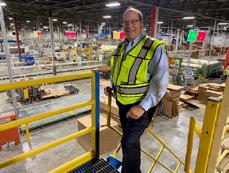
Kevin Ausburn, chairman and CEO, in SMC Packaging Group’s new expansion on Progress Place, Springfield, Missouri.
do,arnd it was, ‘Take care of them at all costs, and it will work out in the long run.’
“We have always been focused on being open and transparent with our employees, to be honest, open with the customer— tell them what you can do, and do it, and don’t tell them something you can’t do,” he adds. “I think that’s served us well over the years.”
Over in Kansas City, Vern Bennett, general manager of SMC’s Arrowhead Containers division, agrees, saying, “Our philosophy is more about service and quality. How can we make life easier for our customer?”
That same service and relationship ethos is also apparent at Wonder State Box in Conway. “Our customers have been very loyal, based on relationships and on a handshake,” Ausburn says. “We still operate that way. Just sit down, work out the particulars, shake hands, and let’s do business. It’s a very good customer base.”
Equipped to Serve
Like many independents, SMC’s namesake, Southern Missouri Containers, began operation in 1972 with an assorted mix of used equipment typical for a startup sheet plant. “We had a slitter, a taper, and a Koppers two-color rotary die cutter. That was a big investment for us,” Ausburn recalls.
The Koppers die cutter lived a long life at SMC, Ausburn says, serving in Springfield and, later, Kansas City, until it was replaced and sold earlier this year. “It was nearly 50 years old, but that’s how we did it back in the early days: buying used equipment and trying to get as much as you can out of it—squeeze as much production as you can out of it and keep it operational.” Ausburn credits their crack maintenance team for the equipment’s longevity, saying, “We had some on-the-job maintenance people who could fix anything from a tractor to a rotary die cutter to the HVAC system. We were fortunate to have people who were very economical; they wouldn’t spend a lot of money to keep us operational.” SMC maintains this approach, as its Wonder State division still employs a similar-vintage Koppers flexo folder gluer.
As SMC grew, driven by a talented team of sales professionals, customer needs demanded newer, faster, and better equipment. “Our sales group could sell anything—we’ve always been more sales- than production-oriented— but over time we realized that you can only serve your customers with used equipment for so long, and eventually, you have to invest in new to assure quality for the customers and improved safety for our employees. We had to make that jump.” SMC’s North Belcrest location houses its 98" Fosber corrugator producing B, C, E, and BC/EB doublewall board. Among the printing, die cutting and finishing equipment also in Springfield are: a Latitude Mini 27" x 71" three-color flexo folder gluer; a BW Papersystems 50" x 113" two-color flexo folder gluer; Hycorr 66" x 115" two-color rotary die cutter; Hycorr 66" x 135" four-color rotary die cutter; BW Papersystems 16000 G-Grafix six-color rotary die cutter with four outside and two inside color capability, and a BW Papersystems 16000 G-Grafix 66" x 125" three-color flexo folder gluer with two outside and one inside color. The printing presses are also equipped with JB Machinery dryers. Rounding out the mix are a Latitude Jumbo 89" x 189" two-color rotary die cutter, an Automatan large-format labeler, an IMG Maxcut autoplaten die cutter, and two specialty folder-gluers: a J&L Mark 5 190" and a Bobst Expertfold 300.
The investment philosophy apparent in Springfield’s equipment arsenal is duplicated in Kansas City and Conway, with slight variations in each. In Kansas City, the equipment mix is tilted toward its higher graphics market, with a BW Papersystems 16000 G-Grafix two-color rotary die cutter, a BW Papersystems 38" x 96" two-color flexo folder gluer with diecut section, and a BW Papersystems 66" x 115" four-color rotary die cutter with JB Machinery dryers. Complementing these are an Automatan 4260 labeler, a one-cut auto flatbed die cutter and a Bobst Expertfold 300 specialty folder gluer. SMC’s sheet plant in Conway is similarly equipped to serve its market’s unique customer base, with a Hycorr
66" x 115" two-color RDC, an Apstar 66" x 126" two-color rotary die cutter, the Koppers 66" x 110" two-color flexo folder gluer, and a J&L specialty gluer, among other machines. Beyond the physical equipment in each location, SMC links all its locations with its internal information system, and all corrugator and converting order entry systems are linked via Kiwiplan scheduling and real-time order tracking for on-time customer delivery.
A Cohesive Culture, a Team Spirit
When asked about the people of SMC Packaging Group, Ausburn simply says, “We don’t have a lot of people that think of coming to work as a job. We’re not punching the clock at 8 so we can get home at 5. People come in and they do what they need to do to get the job done.”
Ausburn credits this attitude with the culture their management team has created over the years. “We’re not really good strategists,” he admits, “but we’re big on culture. We’re big on making sure that our employees have the tools to do their jobs, and to do their jobs successfully. They’re excited about coming in to work.”
The management team assembled at SMC’s Springfield headquarters is generational. Ausburn, a second-generation owner, is joined by President and Chief Operating Officer Rich Bachus and Executive Vice President Randy Bachus, both sons of founder Chuck Bachus. Kevin Ausburn and Rich Bachus both joined the company in 1982, and Randy joined in 1987. Preceding them all in his tenure with SMC is Mark McNay, who joined the company in 1978, right out of college. In Ausburn’s words, McNay is “a very, very valuable member of our team—a planner extraordinaire.”
In Kansas City, Bennett is a 26-year veteran, and in Conway, General Manager Jimmy Toal joined in 2017, coming with 30 years of corrugated experience. And at the Sooner Packaging distribution center in Tulsa, General Manager Gary Robinson is celebrating 20 years with the company. There’s also a third generation of family involved in SMC: Kevin’s son Matt Ausburn has been with SMC over 10 years and is chief financial officer and a member of the board of directors. Melissa Ausburn, Kevin’s daughter, has been with the company for over three years in its graphics
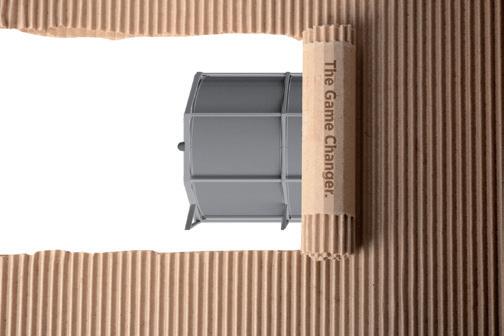
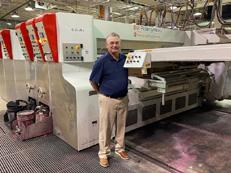
Vern Bennett, vice president and general manager of SMC Packaging Group’s Arrowhead Carton division in Kansas City, and the plant’s BW PaperSystems G-Grafix 16000 two-color flexo folder gluer with die-cut section.
department, coordinating branding and social media efforts.
The long-tenured firepower enjoyed by SMC attests to the leadership’s commitment to openness and transparency with the team. Aiding this cultural advantage are targeted financial incentives as well: an employee stock ownership plan (ESOP) as well as incentive plans still resembling those employed by Hoerner Boxes, the training ground for the company’s founders (see sidebar, “The Enduring Legacy of Hoerner Boxes”). Referring to the company’s early days, Ausburn credits the timeless effectiveness of the Hoerner Boxes incentive system with driving the company’s profitability. “We’ve been bottom line-oriented, incentive-oriented, going back to the old Hoerner system,” he says. “That commission and incentive system that drove the Hoerner organization drives us today.”
Discussing the ESOP, Ausburn calls it “a big underlying theme that ties us all together.” We’re very big on being transparent to people—how we’re doing, what we’re doing, what we see coming down the road, the investments we’re making, and the challenges that we have.” Ausburn explains that the ESOP owns 25% of SMC Packaging Group, and all employees, once they’ve satisfied the minimum age and service requirements, are automatically enrolled. “They start getting a growing ownership stake in the company,” he says, explaining that although the company has traditional retirement plans such as a 401k, the ESOP is the one whose value each employee can directly influence. “I tell our employees, ‘The ESOP is the one retirement vehicle that you can control how that investment performs every day when you come to work. With the ESOP, every day you’re working and everything you’re doing on your job has an impact on how the company is performing, how profitable we are, how we’re growing, and how we’re valued at the end of the day.’”
Growth and Future
SMC’s trajectory of growth through its nearly 50-year history reflects that of many companies in the industry. “We’re like a lot of independents,” says Ausburn. “We’re all opportunists.” Seeking opportunity has driven the company to also seek the commensurate space in which to accommodate it, and that, says Ausburn, is not always a straight-line path. “We started at that building over on Belcrest, added on to it a couple of times; we buy a facility next door, then we lease some space, lease some more space, buy a building, and before you know it, we’re sitting here with five or six facilities, trying to run a business.”
Ausburn says the process drove them to seek a consolidation of the properties into a larger, more efficient layout, and that led them in early 2020 to their newest location on East Progress Place in the Springfield Partnership Industrial Center. “It was a three- to four-year process, but next thing you know, we find this space here, and it was a pretty big leap for us at the time on a cost standpoint, an acreage standpoint, and construction schedule,” he recalls, adding that past decisions required the same “leap of faith.”
“It was like our decision to upgrade our corrugator years ago, to go from our old Langston fingered machine to our high-speed Fosber,” he adds. “We just had to make that leap of faith and push beyond the concerns, realizing that we had a good team backing us up and some opportunities we had to take advantage of. So we charged ahead with this building.”
The transition hasn’t been without a few sleepless nights, Ausburn says. “We had this construction going on, adding 250,000 square feet to the building; we had three pieces of equipment coming in, and then COVID hit. We said, ‘Oh my gosh, what have we done?’”
The fears were short-lived, Ausburn says, because shortly after a “wobbly” first quarter of their fiscal year, business “took off like a rocket.” Ausburn says had they not pushed ahead with the move and expansion, SMC would not have been able to take advantage of the surge in demand. “We wouldn’t have
been able to handle the growth we experienced in 2020 if we hadn’t done the expansion. It set us up, timingwise, just perfectly.”
The growth in box demand aside, the pandemic affected SMC in adverse ways as well. One of Ausburn’s major frustrations was the curtailment of the company’s regular quarterly meetings with all employees. “We’ve been doing that for 25 years,” he says. “COVID hit, and that’s turned us upside down. It’s been awkward here the past year and a half.”
Randy Bachus echoes Ausburn’s concerns from a sales standpoint, saying, “The major challenge this past 18 months has been shifting the sales process from in-person, face-to-face business transactions to video meetings, phone discussions, and email. We sell solutions, and when you are unable to physically see the customer’s challenges, we have had to learn to adapt.”
Yet, he also lauds the sales team’s ability to transition as well as the loyalty of their customers during the pandemic: “Our major accomplishment has been that we must have adapted, as we have had continued growth in spite of these challenges. We have been fortunate to build a network of customers providing referrals, and I believe this has been a part of the 50 years of success we have enjoyed.”
Community and Industry SMC is an active participant in the communities it serves. Ausburn and his team are firm believers that the “network of referrals” alluded to by Randy Bachus earlier is a direct result of visibility in and service to their local cities, towns, and counties. “A large reason for our success is the community we operate in,” Ausburn says. “You don’t operate in a vacuum; we feel like it’s important to give back to our community not only financially but with our time.” Ausburn lists Chambers of Commerce, charitable
organizations, and local foundations to which he and SMC employees have contributed. “You’re not doing your full role if you’re not helping your community to grow and prosper.”
As with the company’s involvement in the community, the Ausburn and Bachus families have also been actively engaged with AICC and other industry organizations. Ausburn’s father, Ross, was active on the AICC board of directors in the 1980s, and Kevin Ausburn has followed suit, serving in the past as an AICC regional director and currently as a director at large. “Ross [Ausburn] and Chuck [Bachus] were very supportive of AICC,” he recalls. “They joined a couple years into the Association’s founding, and one of the big benefits they believed in was being connected to other people that are doing the same thing we are, fighting the same battles, and learning from them.” Pointing to specific examples, Ausburn says, “Anytime I’ve been in another member’s facility or talk to other AICC members, it may not be a major thing, but I’m always picking up something to bring back and say, ‘You know, we can do that,’ or it turns on a light bulb that says there’s a way we can deal with a particular type of issue.”
Future View As SMC Packaging Group looks forward to its 50th anniversary next year, Ausburn remains bullish about the state of the corrugated industry. “I’m probably as excited about the box business today as I have ever been since I started in it in 1982,” he says. “In fact, I’m pretty optimistic about manufacturing in general.” Noting the pandemic-induced backlogs in the supply chain, he predicts more manufacturing will return to North America, a development he sees as good for the corrugated industry. “We went through that cycle where everybody was going to Mexico to manufacture or
Southeast Asia or China, but now we realize that those long supply chains and all the events that can happen around the world—whether economic events or health events like the pandemic—can really impact on your ability to take care of your customer. We need to get manufacturing resources back closer to the customer, and that’s going to benefit the box business.”
His optimism notwithstanding, Ausburn remains methodical and measured about SMC’s growth. “We don’t just go out on a lark and buy a six-color machine just because it’s the latest, greatest and the hot toy that everybody needs,” he says. And noting that this go-slow approach has afforded them the luxury to evaluate various investment options, he says, “Whether it’s high-speed flexo folder gluers that have all these capabilities, ‘Is this really a need we have? Maybe, maybe not.’ But at least we can think about it and reasonably consider it, whereas years ago, it would have been outside the realm of possibility.”
SMC Packaging Group’s successful growth has been built on a solid foundation of honoring its heritage, building a culture of transparency and honesty with its employees and customers, continued investment in equipment, technology and resources for growth, and dedication to its communities. Yet, as much these SMC core ideals have played a key role in the company’s growth and success, Ausburn is careful to maintain his basic entrepreneurial instincts: “We’re not a bleeding-edge company,” he says. “We’ll let someone else do the bleeding, and then we’ll try to figure out what we can do to make money with it.”
Steve Young is AICC’s ambassador-at-large. He can be reached at 202-297-0583 or syoung@aiccbox.org.










